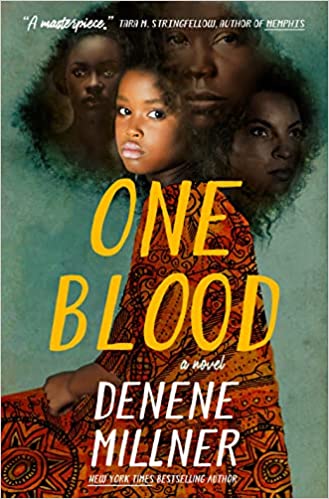Why I Wrote One Blood
by Denene Millner
 I discovered my adoption certificate at age twelve, while snooping in my parents’ private papers. They’d kept it a secret because doing so made sense for them, so I made it make sense for me, too, pushing it past blood, heart muscle—memory—to become thread in the fabric of the Millner clan. For the longest time, that was beyond enough.
I discovered my adoption certificate at age twelve, while snooping in my parents’ private papers. They’d kept it a secret because doing so made sense for them, so I made it make sense for me, too, pushing it past blood, heart muscle—memory—to become thread in the fabric of the Millner clan. For the longest time, that was beyond enough.
That changed, though, when I got pregnant with my first baby and my doctors asked for health history I couldn’t give them. Suddenly, information I thought wasn’t important actually was: What and who is in your blood?
I knew only the small detail my father shared when I was grown: my parents, looking to adopt a baby girl, found me in an orphanage four days after someone left me on the stoop there. Over the years, I’ve used my imagination to fill in my adoption details: Maybe my birth mother was scared to raise a baby on her own, or didn’t have family support, or was in an abusive relationship. Whatever the detail, she gave me life, and then gave me life again by giving me away—a selfless, heartbreaking decision I can only understand because I’m a mother who birthed her own babies and couldn’t fathom the strength it would take to give them to someone else.
It is the ultimate sacrifice. A miracle.
It was my mediation on miracles, adoption, motherhood, choices, and blood that led me to One Blood, an epic, fictional story about the connection between three women: a birth mother who had her child taken away; the adoptive mother who raised that child; and the child who is the product of the two. In One Blood, I’m exploring how race, culture, history, gender inequality, respectability, marriage, mothering, DNA, hate, and, ultimately, love inform the lives of three women intricately connected, and how each of these things can either destroy us or set us free.
I wrote this story because I have many questions and zero answers about my adoption. I wrote this story because my birth mother’s decision to give me away deserves nuance. I wrote this story for my mother and the Black women of her generation, who were led to believe their survival was dependent on their being mothers and wives, and that this should be their sole ambition—even as American racism conspired to stop them from succeeding. That my mothers fought through this gauntlet of heartache, loss, subterfuge, patriarchy, and pain and came out on the other side of it is a miracle that warrants exploration.
This, indeed, is the intent of One BloodOne Blood: to help us get to the miracle of freedom.
Here’s to spreading our wings.
